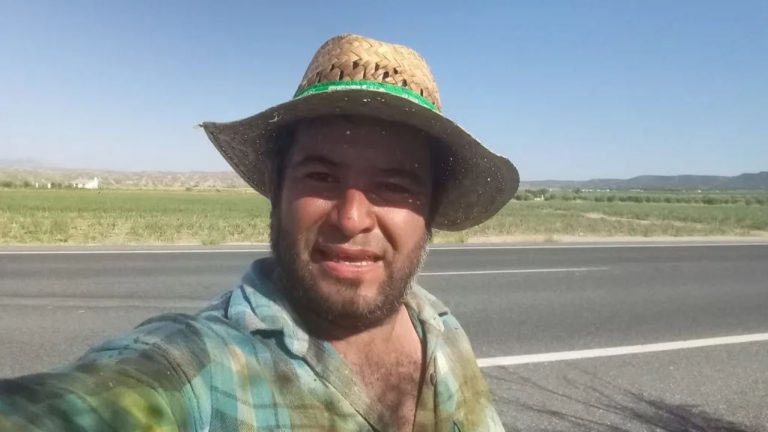6 de agosto 2020

News About Sheynnis Palacios Not Covered by Media Operating in Nicaragua

PUBLICIDAD 1M
PUBLICIDAD 4D
PUBLICIDAD 5D
He was working in 111⁰F heat. After fainting from heat stroke, he was abandoned in the doorway of the health clinic and died

Eleazar Blandon in a photo he sent to his sister Ana, a few days before his death. Courtesy photo
Eleazar Blandon Herrera, 42, left Nicaragua for Spain in October 2019, in search of work. He was supporting four children from his former marriage, and his current wife was five months pregnant.
His plan was to work and then return to start a business in his native Jinotega. However, the trip wasn’t what he had expected: his living conditions were unstable, and when the pandemic put a hold on his application for asylum, he had to accept a job on a watermelon plantation. There, the workdays were eleven hours long, in high temperatures and without access to water.
On August 1st, he collapsed with heat stroke and died hours later, after being left in the doorway of the health center in Murcia, Spain.
His family members in Nicaragua still can’t believe it. His wife Karen, with her recently born son who will never know his father, told the Spanish newspaper “El Pais”, “I just want him to talk to me and tell me that he’s alright.”
Blandon’s siblings spoke with Confidencial, revealing two other sad coincidences. Nineteen years ago, Eleazar’s father, also a migrant, died from heat stroke in Texas. More recently, in fact barely a week ago, Eleazar’s mother had finally gathered enough money to buy him an airline ticket, so he could return home.
He was going to return in October, but he went to work on the plantation to be able to pay the expenses that remained: to survive for a few months more and pay for a COVID-19 test, so as to be able to enter Nicaragua when he returned. He died two days later.
Eleazar’s work was painful for him. He suffered from back problems as the result of an operation when he was 28. He had told his family that the foremen on the plantation mistreated the day workers.
Ana Blandon, his sister, and also a migrant worker in Spain, told the El Pais newspaper that Eleazar had called her crying one day. “They humiliate you here,” he told me. “They call me a donkey, they scream at me, they tell me that I’m slow. They throw dust in your face when you’re bent over. I’m not used to being treated like that.”
At times, Eleazar would kneel in the fields because of his back pain, but they scolded him. He was supposed to remain bent over, in order to do the work more quickly.
When he fainted, they didn’t immediately take Eleazar to the health center, Ana told Confidencial. According to the testimonies from his fellow farmworkers, when Eleazar fainted they waited until the only transport vehicle had returned.
Then, when the vehicle arrived, they decided to wait for the workday to finish so as to take full advantage of the trip. When the vehicle finally left, it first dropped everyone else off at their homes, and then finally took him to the health center where, as Ana learned, they left him in the doorway without notifying anyone or calling an ambulance.
As of August third, Ana had still not seen Eleazar’s body. She only knows about him because the Spanish police showed her his passport and confirmed that he was wearing the same clothing as in the last photo that he had sent Ana two days before.
Ana recalls the day of that photo. It had been two days since Eleazar had communicated with his mother in Nicaragua, and she had asked Ana to look for him. Ana sent him a WhatsApp message, and he answered with two photos taken on the watermelon farm. “God save you,” Ana recalls saying to him,” because I’d never seen him in such a crappy state. With those clothes – he died wearing those same clothes he had on in the photo.”
Eleazar is the eldest of five siblings. His family had already experienced a large loss in 2001 when their father died, also from a heat stroke, followed by a heart attack in Texas, where he had emigrated.
In Nicaragua, Eleazar had been left without a job. His sister Ana helped him go to Spain to look for work. His application for asylum was delayed because of a long waiting list, and with the arrival of the COVID-19 pandemic it became impossible for him to complete the requirements.
The Jinotega resident had obtained work delivering water, in a truck that he shared with another workmate. However, the norms in Spain changed with the pandemic, and it was then forbidden for two people to be in the same vehicle.
Eleazar was fired, and his back problems returned. Ana told us that there were days when he couldn’t get out of bed, and they had already denied him medical attention once. Because of that, he remained in the apartment where he lived with other people. His roommates helped him get back on his feet.
Ana remembers that when the restrictions imposed for the pandemic “softened”, she called him and told him to come over and pick up some food. But when he was entering the building, he was detained by the Police, “because going out on the street was forbidden.”
“I had to show them the food that I was going to give him to avoid his being arrested,” Ana remembers, with a voice full of impotent anger.
At the end of June, Eleazar got work havesting watermelons and had to move to another city. Ana had warned him that if he went very far away, it was going to be hard for her to help him. Nevertheless, he answered her: “I have to work”.
On the plantation, in addition to the fact that they wouldn’t allow him to work on his knees to alleviate the pain, they also didn’t give him water to drink, despite the high temperatures. According to the article in El Pais, his landlady saw him washing out a bottle of cooking oil to take cold water to work. With all these sacrifices, Eleazar earned 30 Euros a day (US $35.63), and even that depended on how many truckloads of watermelon they could pick.
Eleazar’s workmates told Ana that on the day of his death they had filled eight trucks with watermelons at temperatures over 111⁰ Farenheit (44⁰ centigrade). That was the moment when Eleazar collapsed.
Kamil Blandon, one of Eleazar’s brothers, works in Jinotega as a taxi driver. He recalled in an interview with Confidencial that Eleazar decided to leave for Spain when he lost his job in the large commercial stores. He was living “hand to mouth”, Kamil affirmed.
In Jinotega “he wasn’t going hungry,” Kamil stated, but the limitations he had forced him to travel. He wanted to be able to help his children, including the youngest, who was born while he was in Spain and is now seven months old.
Of the four children from his previous marriage, the two oldest lived alone in a house after they were abandoned by their mother. The two youngest were under the care of their grandmother.
Kamil also recalled that, despite the distance, Eleazar wrote to him at times and would ask him to record himself on WhatsApp with the songs he liked, to be able to hear the voices of his family members.
In Spain, the case is under investigation. According to the article in the Spanish newspaper, a 50-year-old Ecuadorian was detained. He was the one who supposedly offered the job to Eleazar, but he isn’t the owner of the farm.
According to Ana, the man was later released, although neither the police nor the court office would give her any information.
Ana complained that on the night that Eleazar died, she found out from a workmate and not through the authorities. When she arrived at the hospital, they wouldn’t allow her to see the body; she said that they only gave her “a piece of paper with the name of the forensic doctor”.
Yolanda Diaz, the Minister of Labor in the Spanish government, stated that the case was under investigation, according to the report from the digital site Despacho 505. “Labor safety and decent working conditions are priorities of the Ministry of Labor. The inspection team is looking into what happened in Murcia. I offer my full support to the family and those closest to the worker in these difficult moments,” the official declared.
Amid sobs, Ana Blandon told Confidencia that up through Monday she had still been unable to view the body of her brother, and that a police official had warned her that it would be very difficult for any country in the world to receive a body from Spain.
“They told me that if before it was difficult, now with the COVID issue, no country is going to want to accept a body from Spain, much less a dead one,” she lamented.
The only offer they had was from a funeral parlor that offered to freeze the body until flights between Nicaragua and Spain were resumed. That would be a wait without a clear end date.
Ana, who is alone in Spain, affirmed that most of the time she finds out about what’s happening with her brother’s body from the news channels, but that no authority has informed her of anything. In Jinotega, the family is devastated.
Eleazar’s mother is trying to annul the ticket she had bought with the money she had managed to raise, and the family is doing everything possible to get together the money to repatriate his body. Ana has opened a bank account, # ES9700815455880002520461 for anyone wishing to donate. However, up until Monday, beyond expressions of solidarity and promises of support, they had only collected 85 Euros ($US 100.95).
PUBLICIDAD 3M
PUBLICIDAD 3D